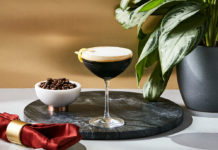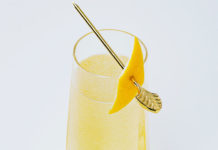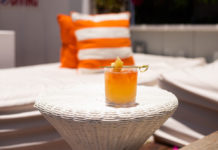 As the end of the year approaches, the Bacardi Portfolio U.S. Ambassador Team is delighted to announce their top eight trends for 2019.
As the end of the year approaches, the Bacardi Portfolio U.S. Ambassador Team is delighted to announce their top eight trends for 2019.
Known throughout the spirits industry for their unrivaled passion and in-depth knowledge, this expert team of U.S. Ambassadors illustrates the most noteworthy trends to come in the New Year. From the reemergence of Italian spirits, a bitter revolution, and a focus on sustainability and socially conscious imbibing, the Bacardi Portfolio U.S. Ambassadors have the insider details on what’s to come in your glass for 2019.
“DRINKING WITH A SOCIAL CONSCIENCE”
Colin Asare-Appiah, East Senior Portfolio Ambassador and Director of Multicultural Lifestyle & Advocacy
In today’s climate more and more people are seeking out drinks with a social cause attached. From brands to bars, products and recipes are going beyond consumption and tying themselves to worthy initiatives in order to bring awareness to movements they believe in.
Bacardi is doing this through its Spirit Forward Women Empowerment Series, where it hosts a day of seminars and round tables in an effort to champion the outstanding females that make up the hospitality industry. Bars are also getting behind social causes, by attaching cocktail purchases to a charity or through inclusive hiring practices where they are expanding their network to offer opportunities for more diverse bartenders. This all trickles down to the consumer who we notice are seeking out those products and establishments that align themselves with a social cause. It’s a movement that I hope will transcend from simply being a growing trend in 2019 to becoming the new norm across the board.
“THE FUN DAYS OF BAR CULTURE & COCKTAILS ARE COMING BACK”
Duane Fernandez, Houston Portfolio Ambassador
Quiet speakeasy bars will always have their place in today’s cocktail scene. However, folks are once again excited to go to their more casual local watering hole, knowing that they can still have a great cocktail, without all of the seriousness behind it. In these relaxed establishments, the bartenders are enjoying recreating fun cocktails that are familiar in taste, bright and vibrant in color, and presented with an over-the-top garnish. These cocktails bring back memories of drinking in the early 90’s, sipping on cocktails with playful names, bold colors and tastes, but without the overly sweet flavors and artificial ingredients of the past.
Today, selections tend towards naturally colored products like MARTINI & ROSSI Bitter and naturally flavored spirits like BACARDI Banana. Since bartenders have so many more options to choose from, this fun-filled moment in time can happen at almost any bar.
“AN IRISH WHISKEY RENAISSANCE”
Anna Kah McLoughlin, New York Portfolio Ambassador
As one of the fastest growing spirits categories, Irish whiskey has been booming over the past few years. In the 1980’s, there were only 2 distilleries left in Ireland. As of August 2017, there were 18 operational distilleries with 16 more in the works. The Teeling Whiskey Distillery opened in the heart of Dublin 125 years after the last distillery was shuttered there. Not only are they leading the Irish whiskey renaissance with their experimentation, but the liquids are highly regarded and awarded amongst their peers and bartenders alike.
Across this exciting category, keep an eye out for a lot of innovation including different cask finishes, experimental yeast strains, and terroir-driven raw ingredients.
“THE ETHOS OF SUBTLE-SUSTAINABILITY”
Taylor Hansen, Chicago Portfolio Ambassador
The beauty of this trend is that it’s not a trend. I believe we are witnessing the beginning of a shift in approach to cocktail programs. The Bacardi brands have been working very hard to push sustainability, as well as forward thinking throughout the industry. This was never going to be a swift change, but the gradual turning of an oil tanker. We are beginning to see these efforts come to fruition, albeit indirectly, across America and at our favorite bars.
How are bartenders manifesting their approach to sustainability?
The cocktails themselves: The United States Bartenders Guild Most Imaginative Bartender focused on zero-waste cocktails to win the competition, in-line with Bombay gin being the most sustainable distillery in the world. This approach has garnered a lot of attention, as food waste in our society is astronomical. Bartenders are focusing on being creative without being wasteful.
Bars and restaurant groups are dropping straws unanimously: In line with this trend, bartenders are constantly on the lookout for alternatives. Using metal straws is a tedious process to keep clean, but bar teams are willing to sacrifice that time in order to make a difference.
Menus are changing: The overall size is shrinking and being simplified to save on waste. Menus are being changed less often as well for the same reasons.
Bars are using less glassware: Cocktail bars in particular are shrinking their back bars to remove clutter and add substance. Generically shaped glassware allows for less dishwasher use, allowing bars to curb water waste.
“POWER PINK DRINKS”
Jaymee Mandeville, West Senior Portfolio Ambassador:
Back in the early 2000’s, the United States embraced the Cosmopolitan, making this pink drink the chic and “it” cocktail to consume. While the drink is credited to Toby Cecchini, it was Dale Degroff of the Rainbow Room NYC who helped perpetuate its pop-star status popularity. Fast forward to 2008, when Dale’s protege, Julie Reiner opened up Clover Club, paying homage to the pre-prohibition raspberry and gin-forward fluffy sour. Since then many bartenders have forgone fun and fruity for bitter and boozy. In this coming year I think we will see the bittersweet symphony of both styles.
“SALUTE TO ITALIAN IMBIBING – A BITTER REVOLUTION”
Dan Long, Los Angeles Portfolio Ambassador
Bartenders continued quest for information, and hunger for knowledge has them focusing on Italian spirits.
Realizing that vermouth is not as simple as sweet vs. dry, or Italian vs. French, they have embraced the many categories of vermouth and have begun to understand what separates each category. Embracing the differences such as base wines, bittering agents, herb blends, and base sweeteners, a trend of layering these fortified wines to build more complex, yet still low-ABV cocktails has emerged. Barolo Chinatos, Vermouths di Torino, and French Kinas are no longer bottles that confuse the modern bartender. The MARTINI & ROSSI Riserva vermouths have seen an incredible response because of their bold flavor profiles and complex herbal blends that are crafted from 3 types of artemisia and delicious base wines.
“Grand Bitters” are also starting to find their place in the awareness of bartenders. Different from their cousin “Petit Bitters”, Grand Bitters are used by the measure as opposed to mere dashes. Campari has stood at the forefront of the category for many years, but MARTINI & ROSSI Bitter, Gran Classico, Brodiga, and Contratto have bartenders questioning if “one size does fit all”. No longer content to settle, the modern mixologist is experimenting with different bitter brands to tailor the flavor experience for each cocktail. A Grand Bitter that works well with gin may not be the same one that works well with whiskey.
Amaros have been sought after by bartenders looking for a bitter kick for many years, but a recent trend has them digging even deeper to provide new experiences for their guests. Flip through Instagram and you’ll see photos of newly acquired collections of dusty bottles containing vintage amaros shipped from Italy. The sugar content of amaros helps them retain their aromatic and bitter qualities much longer than that of full proof spirits. Because of this, the liquid treasures inside offer a glimpse into the past and can even reveal changes in recipe and flavor over time. The market for vintage amaros hasn’t exploded in the same way that the market for American or Japanese whiskies has, keeping the price point at a place where the experience can be passed along to customers. Does a bottle from 1962 taste the same as a bottle today? Pour yourself a glass and take a journey through time!








